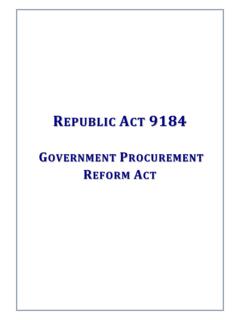Transcription of Closing Commercial Real Estate Transactions
1 Closing Commercial Real Estate Transactions Prepared and Presented by: Douglas E. Cornelius, Esq. Goodwin Procter LLP John P. O Neill, Esq. Holland & Knight, LLP Table of Contents Page i IV. Closing Commercial REAL Estate Transactions ..1 A. Key Differences Between Residential and Commercial Practices..1 (1) Use of (2) (3) Title and Survey..2 (4) Pre- Closing (5) Inapplicability of RESPA..3 (6) Closing Documents..4 B. Current Market Terms/Solutions..6 (1) How to Get Paid and Avoid Liability..6 (2) Status of New Entity Transfer Tax..8 (3) Diligence to Make Sure You Get what You Paid For.
2 9 (4) Commercial Title (5) Zoning/Building Jacket (6) Assignment of Non-Real Estate Property..33 (7) Post- Closing Claims Against the (8) What is Market?: Caps, Floors and Survival Periods..39 C. Entity Formation and (1) Use of Limited Liability Companies, Corporations and Limited Partnerships..40 (2) Patriot Act..47 (3) Opinions..53 D. How to Minimize Tax on Gain..55 Addendum A Assignment and Assumption of Leases ..58 Addendum B Assignment and Assumption of Addendum C Bill of Sale ..62 Addendum D Deed Stamps Legislation ..64 Table of Contents (continued) Page ii Addendum E DOR Directive 95-5: Deeds Excise on Transfers of Beneficial Interests in Nominee Addendum F Trustee s Certificate for Nominee Trust.
3 74 Addendum G Form of Direction of Beneficiary ..75 Addendum H Limited Liability Company Long Form Good Standing ..76 Addendum I Sample OFAC Representation ..77 1 IV. Closing Commercial REAL Estate Transactions A. Key Differences Between Residential and Commercial Practices. (1) Use of entities . The biggest difference between Closing a residential real Estate transaction and Commercial real Estate transaction is the use of entities , rather than individuals, in the ownership of the real Estate . Commercial real Estate is rarely owned by individuals because of the desire to limit liability and the demands of capital sources. Closing a Commercial real Estate transaction involves attention to the organization of new entities and the authorization of the transaction through the management structure of the entities .
4 As there is generally more liability associated with ownership of a Commercial property than homeownership and Commercial property is solely an investment, the owner of a Commercial property will want to isolate risk associated with the property. Ownership in an entity can shield the owner from liability beyond the assets of the property-owning entity. The enabling statute for corporations shields shareholders from the liabilities of the corporation; for limited liabilities, it shields its members from the liabilities of the company; and for limited partnerships, it shields limited partners from the liabilities of the partnership. Of course, entity liability protection is not absolute and should not be a substitute for insurance coverage.
5 2 Investors and lenders want the risks associated with their investment in Commercial property to be isolated to the property. Ownership in an individual s name would tie an investment in the property to the credit of the individual. Commercial property is underwritten by investors and lenders on the cash flow and appraised value of the property, with much less emphasis on the credit of the principals. Having the property owned in an entity will shield the property from the credit risk of individual principals. The choice of entities and the issues related to the entities at Closing are discussed below in Section C(1). (2) Escrow. A Commercial real Estate Closing will generally involve a more formal escrow process than in a residential transaction.
6 Typically, the title agent will agree to hold the money, collect and record all documents, and wire out the money. The more formal escrow is due largely to the larger sums of money involved and the numerous documents that may come in from other capital sources. (3) Title and Survey. Title to a Commercial property is generally more complex than title to a residential property. In Massachusetts, most Commercial property is an amalgam of numerous lots, subject to easements for utilities, old rights of way, etc. 3 For Commercial properties, an ALTA survey is required to delete the survey exception on a title policy. Mortgage plot plans are not sufficient. See Section B(3) below for more information.
7 (4) Pre- Closing Diligence. Most Commercial Transactions provide for a fixed diligence date. Much work needs to be done and agreed upon prior to the Closing . Zoning, title, survey and tenant leases must be acceptable to the purchaser, and the purchaser must raise any objections prior to the expiration of the diligence period. Usually, raising any issues at the Closing is too late and places the purchaser s deposit monies at risk. This topic is addressed in more detail in Section B(3) below. (5) Inapplicability of RESPA. The Real Estate Settlement Procedures Act (12 USC 2601 et. seq.) is only applicable to loans secured with a mortgage placed on a one to four family residential property.
8 Therefore, Commercial real Estate closings are not constrained by the restrictions of RESPA and purchasers/borrowers are not protected by RESPA. The biggest impact on the Closing process without the constraints of RESPA is the general disuse of the HUD-1 form as the settlement statement. For most Commercial closings the HUD-1 is too limited to address the numerous prorations and adjustments involved in a Commercial Closing . 4 Since RESPA is not applicable, there are no limitations on escrows and reserves that a lender can require. Often the lender will require escrows for tax, insurance and capital expenditures. It is also common that the lender requires a lockbox where all of the revenue of the property is sent by the tenants to an account controlled by the lender.
9 (6) Closing Documents. As with residential Transactions , Commercial real Estate Transactions will include a typical quitclaim deed, non-foreign affidavit and title affidavit. However, there will be several other documents included in the transfer package. Unless the Commercial property consists of raw land, there will be an assignment and assumption of leases. This document accomplishes three goals. First, it clarifies that the obligations of the seller under the leases have been passed to the buyer. The seller does not want to be subject to the contractual obligations under the leases for things such as tenant build-outs, etc. Second, the document clarifies that the benefits of the seller under the leases have passed to the buyer of the property.
10 Theoretically, it is possible that the seller could transfer fee title to the property but retain the benefit of the leases. Third, the document is a useful tool for notifying tenants that the property has been conveyed. Many national tenants require formal documentation between the seller and buyer of the property. See Addendum A for an example of an assignment and assumption of leases. 5 There usually will be a sale and assignment of contracts. Typically, the buyer of a Commercial property will want to retain at least some of the service contracts for the property, such as elevator maintenance, landscaping, etc. Service contracts would not otherwise transfer to the buyer with the transfer of fee title.







